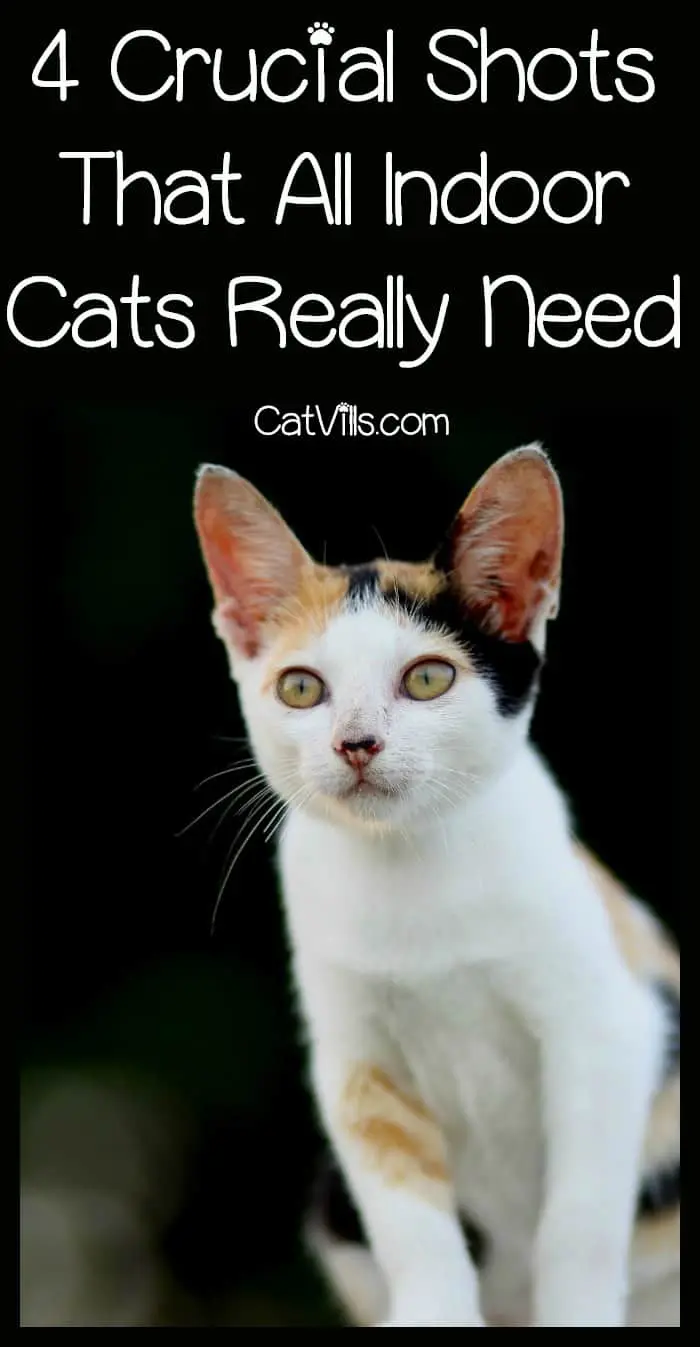Last Updated: 1 year ago
Caring for your pet is similar to caring for a family member. Your cat, like you, requires protection from dangerous infections.
Consider what would happen if your cat became ill and you could do something to keep them healthy. This is where cat vaccinations come in handy!
These minor injections can have a significant impact on your cat’s life. Our guide takes you on a journey through the world of cat vaccinations.
You will learn how these simple vaccinations can protect your pet from dangerous diseases.
We will explain everything in simple language so that you understand why these vaccinations are crucial for your cat’s well-being.
Let’s go on this journey together and determine how often a cat needs vaccinations. You can keep your feline friend happy, healthy, and purring with joy!
Core and Non-Core Cat Vaccinations
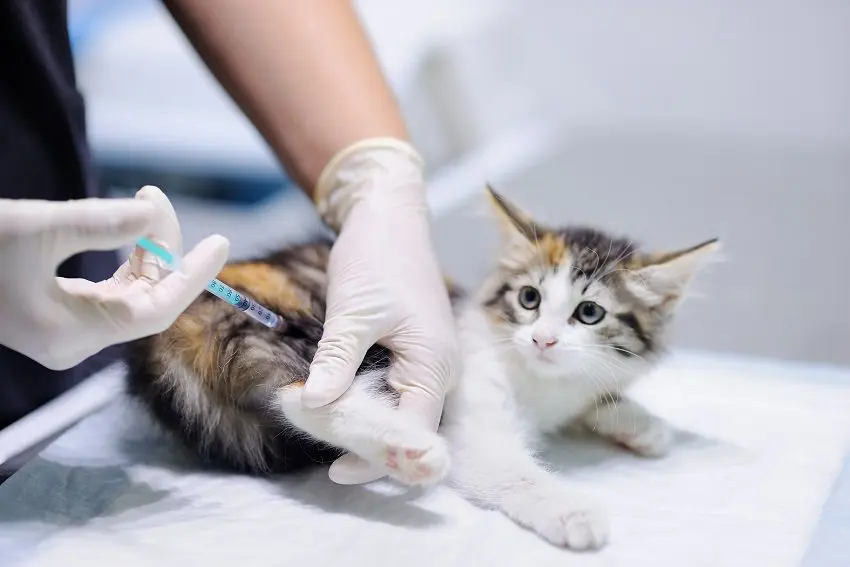
Vaccinations are classified into two types: core and non-core. Both immunizations aid in the health of cats.
The most critical immunizations for all cats are the core vaccinations. These vaccines provide protection against both common and dangerous diseases.
These diseases can be quite hazardous to cats. As a result, all cats are often immunized in order to remain safe and healthy.
Non-core vaccinations, on the other hand, are not for every cat. They are more like optional shots. These vaccines protect against diseases that are not as common.
Their needs depend on where the cat lives, their lifestyle, and other factors.
For example, if your cat spends much time outside, your vet might recommend some optional vaccines to give them extra protection.
Your vet will help you decide which vaccines are right for your cat based on their lifestyle and where you live. Thus, core vaccines are mandatory, especially kitten vaccinations.
And the non-core vaccines are optional. And some cats may need them for extra protection. In any case, timely vaccination is important to her happiness and health.
What Vaccines Should My Cat Get?
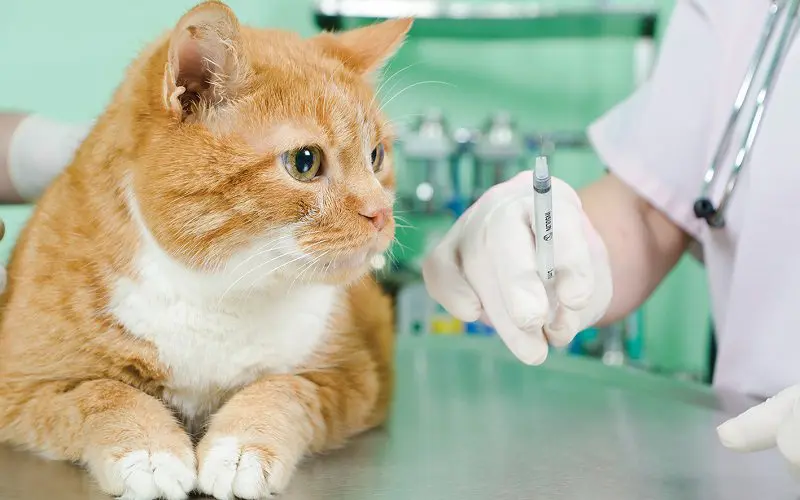
When deciding on vaccines for your cat, consider their age, health, and lifestyle.
Kittens need a series of shots, while adult cats should have core vaccines. Non-core vaccines depend on many factors. Some of them are:
- Walking outdoors
- Contact with other cats
- Place of residence
- Living conditions
The veterinarian will create an individualized plan for vaccination effectiveness. It will keep your cat safe from common and potential threats.
Always discuss this with your vet to ensure your cat gets the right vaccinations at the right time. Regular vaccinations help protect your furry friends and keep them healthy.
Rabies Vaccine
The rabies vaccine for cats is essential for keeping them safe. Rabies is a deadly disease that humans can catch from animals.
Rabies vaccination has multiple functions. It also contributes to the safety of you and your family.
This immunization benefits cats and is required in many countries. Kittens typically receive their first rabies vaccination at around 12 weeks of age.
Following that, kids will require frequent booster shots to remain safe. Only a veterinarian can administer the vaccine. It is usually a standard injection under the skin.
It is a quick and easy process. Once your cat gets the rabies vaccine, they are less likely to get the disease if they contact an infected animal.
Remember, rabies is very dangerous. Once symptoms appear, you cannot cure them.
Therefore, vaccinating your cat against rabies is the best way to keep your cat healthy and safe. And it is also an important responsibility of the pet owner.
FVRCP Vaccine
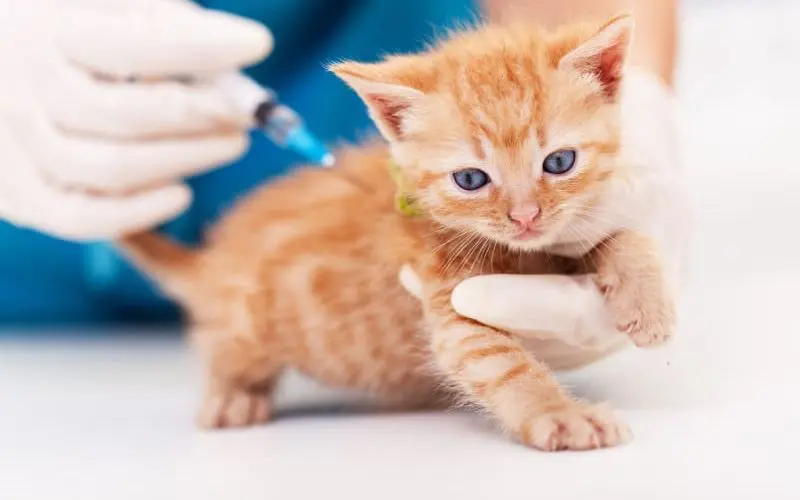
The FVRCP vaccine is a special vaccination for cats. It helps protect them from three different diseases:
- Feline viral rhinotracheitis (FVR)
- Calicivirus (C)
- Panleukopenia (P)
These diseases can cause serious complications in cats. Therefore, a vaccine is very important. The FVRCP vaccine is often called the “cat flu” vaccine.
It is because it protects against diseases similar to the flu in humans. These illnesses can cause symptoms such as sneezing and a runny nose. There can also be more serious problems, such as pneumonia.
Kittens are usually started on the FVRCP vaccine when they are 6–8 weeks old. How often does a cat need vaccinations?
Give your kitten several doses of the vaccine over several months to build a strong defense. Adult cats also need vaccinations to stay safe.
Your veterinarian will tell you how often your cat needs this vaccination. It’s usually a simple vaccination. But it’s a great way to keep your furry friend healthy and happy.
You will be able to prevent these common feline diseases. So, talk to your veterinarian about the FVRCP vaccine for your cat.
FeLV Vaccine
The FeLV vaccine is for cats, and it’s designed to protect them from a disease called Feline Leukemia Virus (FeLV). FeLV is a contagious virus that can make cats very sick.
This vaccination helps cats who spend time outdoors. Or if cats live with other cats that may be sick with FeLV.
Kittens can be started on the FeLV vaccine when they are 8–9 weeks old. They usually require several vaccinations over several months for full protection.
The vaccine helps the cat’s immune system resist the FeLV virus during exposure. It is important to remember that the FeLV vaccine does not protect against all types of disease.
Therefore, your veterinarian will help you decide if your cat needs it. The vet will make a judgment based on her lifestyle and risk of infection.
FeLV can be a serious disease. So, if your cat may be at risk, talk to your veterinarian about the FeLV vaccination.
Cat Vaccination Schedule
Your veterinarian has created a plan to keep your cat healthy, which includes a cat vaccination schedule.
It tells you when your cat should get their shots. Kittens usually start at around 6–8 weeks old and need shots every few weeks until they’re about 16 weeks old.
Adult cats are usually revaccinated every 1–3 years. It allows you to maintain a strong defense. The schedule may include core vaccines, which all cats need, and non-core vaccines.
Your veterinarian will determine the best schedule for your cat to keep her safe from disease.
Kitten Vaccinations
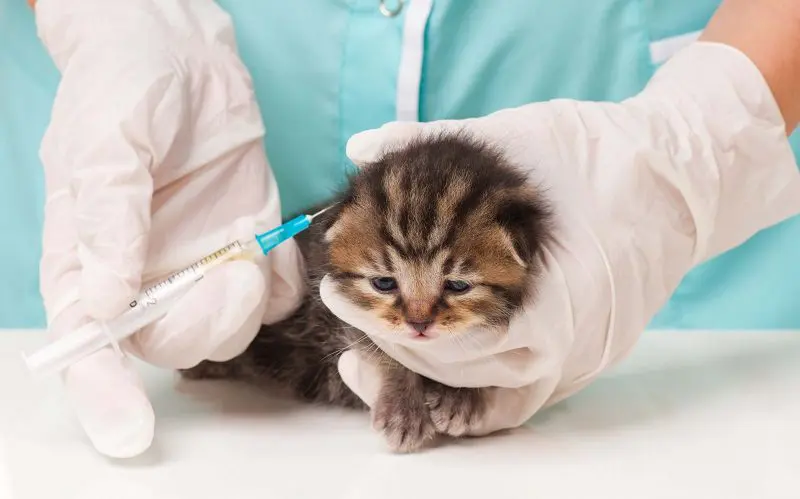
Kitten vaccinations are like shields to protect your little furball from nasty illnesses.
When your kitten is born, they have some protection from their mom’s milk, but it doesn’t last long. So, to keep them healthy and strong, they need vaccines.
Vaccinations usually begin at 6–8 weeks of age. The vet will give them a series of vaccinations over a few months. These vaccinations help create a strong defense against diseases such as:
- Feline viral rhinotracheitis
- Calicivirus
- Panleukopenia
- Feline leukemia
The last kitten shot is usually around 16 weeks old. After that, your kitten might need booster shots when they grow up to keep their protection strong. It’s a bit like giving them superhero powers against sickness.
Always follow your vet’s advice about kitten vaccinations. It’s the best way to ensure your little one grows into a healthy and happy cat, ready to explore the world.
Adult Cat Vaccinations
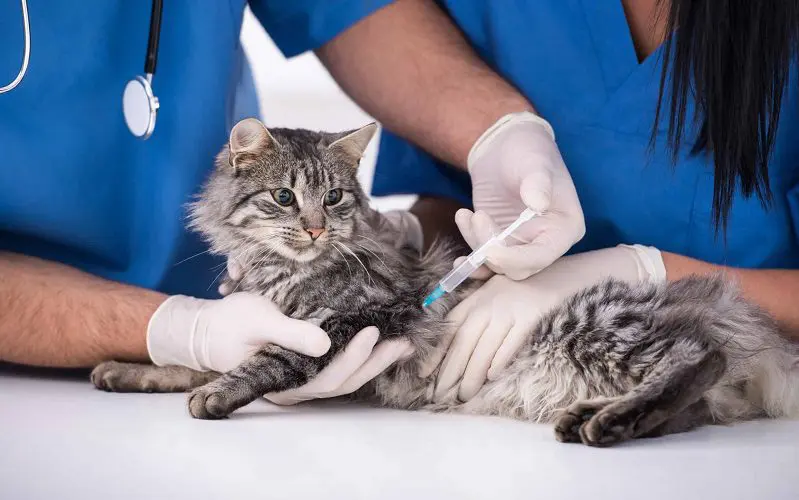
Cat vaccinations are essential to keeping your furry friend strong and healthy. Kittens receive their initial shots, but as adult cats, they need booster shots to maintain their protection.
Core vaccines are usually required throughout an adult cat’s life. Rabies vaccination is required not only for the cat’s health but also for legal reasons in many countries.
Vaccines for non-core diseases may be recommended based on your cat’s lifestyle. A veterinarian can help you decide if this is necessary.
Regular check-ups with a veterinarian are essential for vaccination effectiveness. Vaccination keeps your cat’s immune system at a high level.
It protects it from dangerous diseases. Keeping up with vaccinations will help your adult cat live a long, happy, and healthy life.
FAQs
Are Cat Vaccinations Required by Law?
The legal requirements for cat vaccinations vary from place to place. But you should know that rabies vaccination is mandatory in many countries. It is to protect public health.
Are There Risks Associated With Cat Vaccinations?
The risks associated with cat vaccinations are generally minimal. However, some cats may experience mild reactions. These may include soreness or a fever. Often, it is an individual intolerance to some of the components. Serious side effects are rare.
Are There Any Side Effects After Cat Vaccination?
Common side effects after cat vaccination include mild lethargy or soreness at the injection site. Severe reactions are extremely rare. If you observe something more serious, call your veterinarian immediately.
Conclusion
Finally, immunizations act as superheroes for our cats, shielding them from deadly infections.
Kittens begin vaccines at a young age in order to develop a strong immune system. Cat vaccinations keep them protected as they mature into adult cats.
It is vital to visit the veterinarian on a regular basis and to follow the recommended vaccination schedule. It ensures that your kitty companion is secure and healthy for the rest of their lives.
Remember that immunizations safeguard your cat and help prevent disease transmission to other animals and even humans.
Resources:
